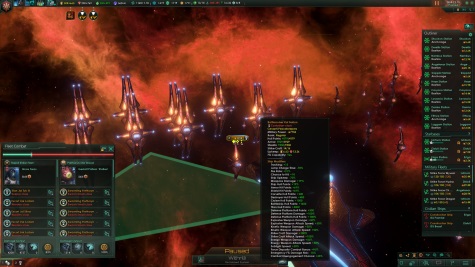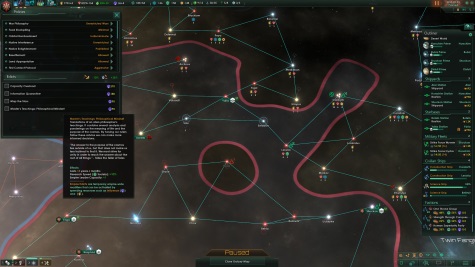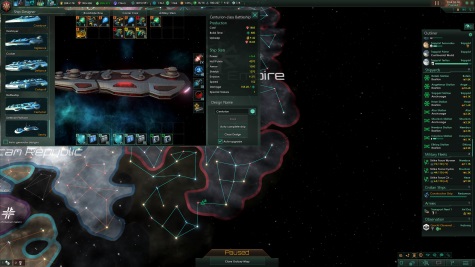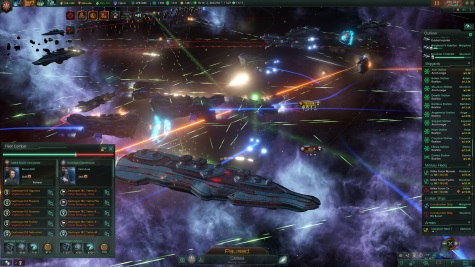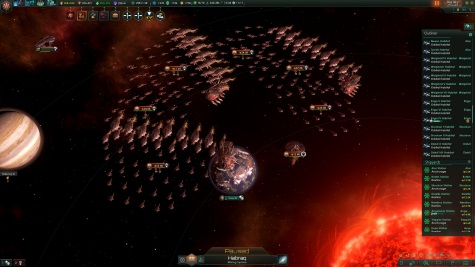Though I have a passing familiarity with the grand strategy games made by Paradox, I am not usually a big fan. They are way too big a time-sink and the complex systems they build don’t always hold together over the course of a long game. I find that trying to play to win these games in a conventional manner often ends up being a frustrating experience but treating them as a role-playing experience is often enjoyable. Plus their plethora of DLCs for every title is both annoying and confusing.
Still Stellaris is the most novel title they’ve made in a while and I really like the idea of their style of grand strategy applied to space. I even bought the Utopia DLC before I started because I really liked the idea of megastructures but I ended up, as usual, not making much use of the content. The gameplay is similar to other games in that you build improvements on planets and assign population to tile. In space, warships are organized into fleets that you direct at will. You also manually control constructor ships which build stuff like orbital mines and research stations and science ships which are used to survey star systems. You basically can’t do anything with unknown star systems until they have been surveyed.
What makes this game a bit different is that there are caps on everything. There are maximum caps on the amount of energy and minerals that you hold for example, which doesn’t matter at first but does matter later. Laying a claim to a star system requires building an outpost there which costs influence in addition to the expected minerals. Naval capacity restricts the number of warships you can build as exceeding it vastly increases maintenance costs. Most importantly, there is a fairly low limit to the number of inhabited systems that you can directly administer. Go beyond that and you need to assign them to sector with their own governors, essentially handing control over to the AI.
I suppose the intent is that micro-management never becomes overly onerous, which is true. However I’ve also found that it acts as a brake to limitless expansion and makes it so that optimizing everything perfectly isn’t really necessary. So it’s okay to play as you wish secure in the knowledge that you’ll never fall too far behind. At the same time, I feel that it makes the game feel a bit boring. I could wage war to make room to expand, but apart from securing some key strategic systems, I often feel little need to do so. Between terraforming, assimilating other species which can inhabit different types of planets and building megastructures, it’s very hard to actually run out of room to expand. The casus belli requirements also greatly restrict what you can gain out of any war. You need to either invest in the Domination tradition to subjugate other empires or spend a lot of influence to claim a significant number of systems owned by the other empire.
The thing is the game seems to think a lot of the fun is in fighting. The most detailed part of the game is in designing your own ships and assembling fleets. Combat plays out in 3D and in real-time even if it’s hard to make out what’s happening amidst the chaos. Optimizing ships to counter the enemy’s designs is highly effective and together with knowing when to fight and when to run, is where the human player has an insurmountable advantage against the AI. In my games so long as I don’t give the AIs massive cheats, it’s not difficult to match their growth and keeping parity with them is good enough to ensure that they almost never declare war on me. This means that I see very little combat until the endgame and until then the game is, well, rather boring.
To be fair, the developers do seem to know this and try to liven the game up with anomalies and story events. You encounter these while surveying and they’re like little snippets right out of old Star Trek episodes. They’re neat to read about but you do eventually get tired of them over multiple games. They also completely stop when you reach the mid-game when everything has been surveyed. I think the mid-game is supposed to be made interesting by Fallen Empires, extremely powerful ancient empires that are dormant and occupy only a few systems, awaken but I’ve never had them become aggressive to me.
The endgame is supposed to be when the game gets interesting again but I found it a bit too interesting. A threat arrives to menace the entire galaxy. They are crazy powerful, with many, many massive fleets. Everyone is supposed to unite against this common threat but in practice, I find that the AI empires are awful at it, even the super-powerful Awakened Empires, and the human player basically has to face it alone. It is possible to beat them I suppose over the long term but losing system after system while the other empires continue to fight amongst themselves was so depressing I eventually gave up after they overran my capital system with all its pretty orbital habitats.
Now that I have a better handle on how the game works I could restart a new game, tuning down the crisis strength a bit and not expanding so much so that the crisis doesn’t take place entirely within my borders. I think playing such a scenario would actually be quite fun. But what I find daunting isn’t being faced with the crisis again, it’s the many, many hours of frankly boring slog that I would need to go through to get back to that point, livened up only by seeing the same anomalies again. It just doesn’t seem to be worth my time.
I do like the game design with my only complaint being that it’s too easy to get all the traditions. Unity is also a little weird in that there’s nothing to spend it on once you get all the traditions and some of the traditions are useless for certain play-styles. I love the massive scale and all of the options that cover all the science-fiction tropes. But the fact remains that much of the game really is just boring expansion and you repeat the same building plan for every planet and every habitat. I suppose some of the DLCs can help with that, and more events and anomalies never hurt. I may buy some of them and get back to this game in the future. But for now, I’m putting it down and moving on to other things.
